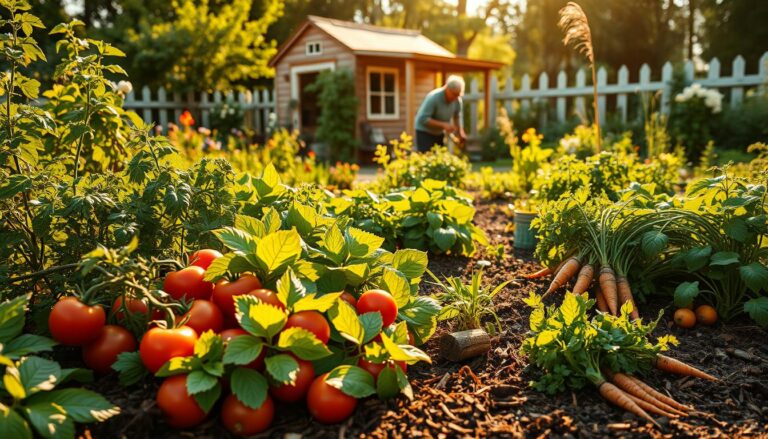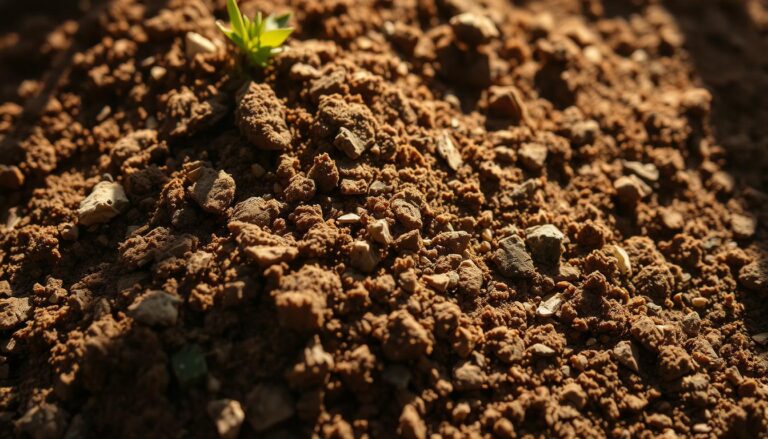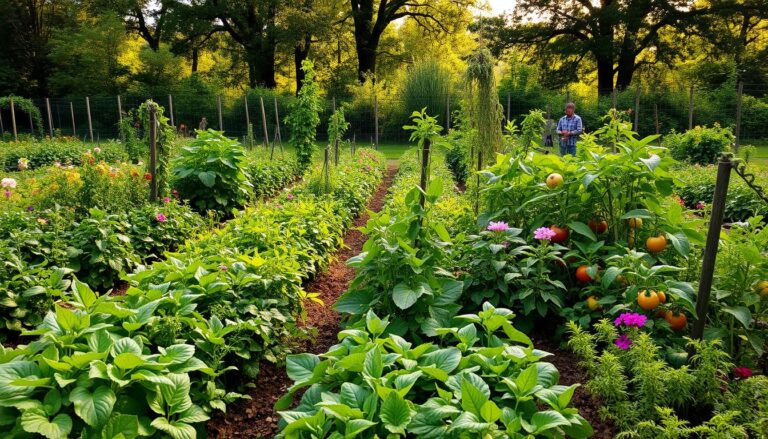Growing your own organic garden is rewarding. It gives you fresh produce and a sense of pride. To succeed, you need the right tools.
Using quality gardening tools makes gardening easier and better for your garden. Organic gardening is good for the planet. The right tools help keep your garden healthy and green.
Investing in the right organic gardening tools will help you grow a thriving garden. It’s good for you and the planet.
Why Quality Tools Matter for Organic Gardening Success
In organic gardening, the right tools are key to a thriving garden. This method focuses on working with nature to create a balanced ecosystem.
The Organic Gardening Philosophy
The organic gardening philosophy is about caring for the soil, plants, and environment. It avoids synthetic chemicals and GMOs. This approach helps plants grow healthy and supports sustainable gardening.
How the Right Tools Support Sustainable Practices
Choosing the best tools for organic gardening is vital for sustainability. Quality tools are durable, efficient, and eco-friendly. For example, tools made from sustainable materials or those that reduce waste help lessen your gardening’s environmental impact.
A comparison of different tool materials and their environmental impacts is shown in the table below:
| Tool Material | Durability | Environmental Impact |
|---|---|---|
| Stainless Steel | High | Low |
| Wood | Medium | Low (if sustainably sourced) |
| Plastic | Low | High |
Long-Term Benefits of Investing in Quality
Investing in must-have tools for organic gardening may seem expensive at first. But, it pays off in the long run. Quality tools last longer, saving you money on frequent replacements. They also make gardening more efficient and enjoyable.
Essential Tools for Organic Gardening: The Complete List
To grow a vibrant organic garden, you need the right tools. Organic gardening means avoiding harmful chemicals and focusing on natural growth. The right tools are key to success.
Overview of Tool Categories
Organic gardening tools fall into several groups. These include tools for soil prep, planting, weeding, watering, pruning, and composting. Knowing these categories helps you choose the right tools for your garden.
Soil prep tools are vital for a fertile garden. You’ll need spades, forks, and tillers to loosen and enrich the soil. Planting tools help seeds and seedlings get off to a strong start.
Must-Have vs. Nice-to-Have Tools
It’s important to know which tools are must-haves and which are nice-to-haves. Must-haves are used daily and are essential for garden care. These include a spade, trowel, fork, and watering can.
Nice-to-haves make gardening easier or improve results. Examples include dibbers, bulb planters, and drip irrigation systems.
Building Your Collection Over Time
Building a full tool collection takes time. Start with the basics and add more tools as you grow. Choose quality over quantity for tools that last and perform well.
Consider your garden’s specific needs. For example, a broadfork is great for heavy clay soil. A wheelbarrow or garden cart is essential for large gardens.
By understanding tool categories, focusing on must-haves, and expanding your collection, you’ll have a thriving organic garden. This garden will grow with minimal harm to the environment.
Soil Preparation Tools for Healthy Garden Beds
A good garden starts with the soil. It needs to be prepared with care using the right tools. This step is key for plants to grow well and give lots of food.
Garden Spades and Shovels
Garden spades and shovels are must-haves for gardeners. A garden spade helps dig and mix the soil. A shovel is for moving soil or other stuff around.
Choose a spade for digging and a shovel for scooping. Think about the job and the soil type you’re working with.
Garden Forks and Tillers
Garden forks and tillers loosen and aerate the soil. A garden fork has tines for gently mixing soil. It’s great for small spaces or around roots.
Tillers break up hard soil and mix in nutrients. They range from small to big, motorized ones.
| Tool | Primary Use | Benefits |
|---|---|---|
| Garden Spade | Digging, turning soil | Precise control, clean edges |
| Garden Fork | Loosening, aerating soil | Gentle on soil structure, effective in tight spaces |
| Tiller | Breaking up compacted soil | Efficient for large areas, mixes in amendments |
Broadforks for No-Till Organic Methods
For no-till gardening, a broadfork is essential. It aerates the soil deeply without turning it. This keeps the soil healthy and its structure intact.
Using a broadfork improves soil drainage and reduces compaction. It also helps roots grow strong. It’s a simple way to keep your soil healthy.
Using these tools will help you create a garden that’s full of life and food.
Planting Tools for Successful Seed Starting and Transplanting
Starting seeds and transplanting them is key in organic gardening. The right tools are crucial for success. They help ensure seeds and seedlings grow well.
Hand Trowels and Transplanting Spades
Hand trowels are vital for planting seeds and seedlings. They allow for precise placement and little soil disturbance. Transplanting spades are for gently moving seedlings to their new spots. They help avoid harming the roots.
Dibbers, Bulb Planters, and Seed Spacers
Dibbers make holes for seeds or seedlings at the right depth. Bulb planters are for bulbs, making planting easier. Seed spacers keep seeds evenly spaced, avoiding the need for thinning.
Seed Spreaders and Precision Seeders
Seed spreaders spread seeds over large areas, saving time. Precision seeders place seeds accurately, improving efficiency and reducing waste.
Using these essential tools for organic gardening makes gardening easier. They help with seed starting and transplanting. With the right organic gardening tools, gardeners can have a better harvest.
Weeding and Cultivation Tools for Chemical-Free Management
Weeding and cultivation tools are key in organic gardening. They help gardeners keep their gardens chemical-free. It’s important to remove weeds to stop them from taking over your crops.
Hand Weeders and Cultivators
Hand weeders and cultivators are vital for weeding in tight spots. Tools like the Hori Hori knife or a weeding fork help remove weeds at the root. This way, you avoid disturbing the soil and prevent weeds from coming back.
Hoes: Stirrup, Oscillating, and Dutch Styles
Hoes are great for different weeding tasks. The stirrup hoe is good for cutting weeds just below the soil. The oscillating hoe works well on both push and pull strokes, making it efficient. The Dutch hoe is best for weeding large areas with its push-pull action.
Long-Handled Weed Pullers and Root Removers
Long-handled weed pullers are perfect for weeds with deep roots. They let you pull weeds without bending or kneeling. This is easier on your back. Some models have a grip to ensure the whole root is pulled out.
Using the right tools for weeding and cultivation makes the job easier. It also helps keep your garden healthy and sustainable. By picking the best tools for organic gardening, you can keep your garden free of chemicals and full of life.
Watering Equipment for Efficient Garden Irrigation
The right watering equipment is key for a successful organic garden. It saves water and makes sure plants get the right moisture. This leads to better growth.
Watering Cans, Wands, and Nozzles
Watering cans are a classic and effective choice. They let you water plants right at the roots. Wands and nozzles are great for hanging baskets and tall plants. Choose ones that are durable and eco-friendly.
Drip Irrigation Systems and Soaker Hoses
Drip irrigation systems send water straight to the roots. This cuts down on evaporation and runoff. Soaker hoses release water along their length for steady moisture. Both are great for organic gardening because they save water and help roots grow strong.
“Drip irrigation can reduce water usage by up to 50% compared to traditional sprinkler systems.”
Rain Barrels and Water Conservation Tools
Collecting rainwater is a smart way to save water and help the environment. Rain barrels catch runoff from your roof. Using rainwater for irrigation cuts down on municipal water use, making it a green choice for gardeners.
| Watering Method | Water Efficiency | Cost |
|---|---|---|
| Drip Irrigation | High | Moderate to High |
| Soaker Hoses | High | Low to Moderate |
| Watering Cans/Wands | Moderate | Low |
| Rain Barrels | High | Low to Moderate |
Using these top organic gardening tools in your watering routine helps your garden stay healthy. It also reduces your environmental impact.
Pruning and Maintenance Tools for Plant Health
To keep your organic garden thriving, investing in quality pruning and maintenance tools is key. Pruning is vital for healthy plant growth and fruiting. It also removes diseased or damaged parts. The right tools make pruning efficient and effective, ensuring your plants get the care they need.
Pruning Shears and Bypass Secateurs
Pruning shears, also known as hand pruners or secateurs, are essential for gardeners. Bypass secateurs are great because they cut cleanly without crushing the plant. This helps in healing and reduces disease risk. Look for ergonomic handles and high-quality steel blades that stay sharp.
Loppers and Pruning Saws
For thicker branches, loppers are needed. They provide the leverage to cut through larger diameters. Pruning saws are vital for thicker branches or precise cuts in tight spaces. They come in various forms, including foldable models for convenience.
Garden Scissors and Harvesting Knives
Garden scissors are great for delicate tasks like trimming herbs or harvesting vegetables. They make clean cuts without damaging the plant. Harvesting knives are also essential for cutting flowers or vegetables close to the stem. These tools help keep plants healthy and increase yield.
By having these essential pruning and maintenance tools, you’ll be on your way to a healthy, productive organic garden. Quality tools may seem expensive at first, but they save money in the long run. They ensure better plant care and reduce waste.
Composting Tools for Creating Organic Soil Amendments
To make kitchen scraps and yard waste into compost, you need the right tools. Composting is key in organic gardening. It turns waste into a soil amendment that helps plants grow well.
Compost Bins, Tumblers, and Systems
The heart of composting is the bin or tumbler. Compost bins vary from simple wire to complex tumblers. Tumblers are loved for making composting easy and fast.
- Stationary bins are perfect for lots of waste.
- Tumblers are easy to use and quick.
- Worm composting systems are great for indoor use.
Compost Thermometers and Aerators
It’s important to check your compost pile’s temperature. Compost thermometers help you do this. Aerators add oxygen, keeping the compost aerobic and odor-free.
Compost Screens, Sifters, and Collection Tools
When compost is ready, sift it to remove lumps. Compost screens or sifters make the compost uniform. Tools like buckets or bins collect materials for composting.
With these essential tools for organic gardening, you can keep your compost healthy. This enriches your soil and helps your garden thrive.
Protective Gear and Ergonomic Supports
Protective gear and ergonomic supports are key for a safe and fun organic gardening experience. Gardening can be tough and risky, with dangers like thorns and strain from lifting.
Gloves and Hand Protection Options
Gardening gloves are a must-have tool for organic gardening. They protect against thorns, splinters, and other dangers. Choose gloves that are tough, waterproof, yet still flexible and grippy.
Knee Pads, Garden Kneelers, and Seats
Kneeling is common in gardening. Knee pads or garden kneelers can help avoid pain and strain. Some even have seats for resting.
Sun Protection and Body-Friendly Tool Designs
Sun protection is crucial for gardeners, who often work outside for hours. Tools with ergonomic handles and wearing protective clothes, like hats and sunscreen, are very helpful.
| Protective Gear | Purpose | Benefits |
|---|---|---|
| Gardening Gloves | Hand Protection | Prevents thorns, splinters, and blisters |
| Knee Pads/Kneelers | Knee Protection | Reduces strain and discomfort while kneeling |
| Sun Hats/Sunscreen | Sun Protection | Prevents sunburn and skin damage |
Using these best tools for organic gardening can make your gardening healthier and more productive.
Material Handling and Transport Tools
Organic gardeners know that the right tools for handling materials are key. They make a big difference in keeping a garden productive and efficient.
Handling materials well is important for moving soil, compost, plants, and harvests. The right tools can save time and make gardening less tiring. This makes gardening more fun.
Wheelbarrows and Garden Carts
Wheelbarrows and garden carts are essential for transporting heavy loads in the garden. They come in many sizes and designs. This includes single-wheel and multi-wheel options to meet different needs.
Buckets, Trugs, and Harvesting Baskets
Buckets, trugs, and harvesting baskets are great for collecting and carrying produce. They’re also useful for mixing soil or compost. You can find them in materials like plastic, wood, or metal.
Mulch Spreaders and Leaf Collectors
Mulch spreaders and leaf collectors make garden care easier. They help spread mulch and collect leaves. These tools keep the soil healthy and the garden looking good.
| Tool | Purpose | Benefits |
|---|---|---|
| Wheelbarrows | Transporting heavy loads | Saves time and labor |
| Harvesting Baskets | Collecting produce | Efficient and convenient |
| Mulch Spreaders | Distributing mulch | Maintains soil health |
Conclusion: Building Your Organic Garden Tool Collection
Having the right tools is key for a thriving organic garden. By investing in essential garden tools, you’ll be ready to keep your garden healthy and sustainable. Each tool, from soil preparation to pruning, is important for your garden’s success.
Start with the basics like a garden spade, hand trowel, and pruning shears. As you get more experience, add specialized eco-friendly gardening tools like drip irrigation systems and compost bins.
Choosing the right tools and techniques will help you create a lush, sustainable garden. This garden will bring joy and nourishment to you and your family. So, start today and watch your garden grow!
FAQ
What are the most essential tools for starting an organic garden?
How do I choose the best organic gardening tools for my needs?
What is the difference between a garden fork and a spade?
Are there any eco-friendly alternatives to traditional gardening tools?
How can I maintain my organic gardening tools to extend their lifespan?
What are some must-have tools for weeding and cultivating an organic garden?
Can I use drip irrigation systems in my organic garden?
How can I protect my skin and eyes while gardening?
What are some essential tools for composting in an organic garden?
How can I transport materials and harvests in my organic garden?

Sortemdia nasceu com o propósito de trazer alegria e oportunidades para todos por meio de sorteios gratuitos de prêmios incríveis. O site tem como missão oferecer experiências acessíveis, divertidas e justas para quem deseja concorrer a produtos, serviços e brindes sem pagar nada por isso. Acreditamos que a sorte pode bater à porta de qualquer pessoa — e no Sortemdia, ela pode chegar com apenas um clique.



